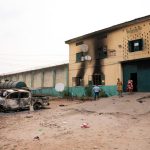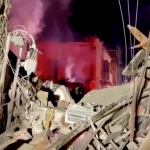From my home in Jerusalem on Sunday morning, I called our local producer in Gaza.
She and I have spoken every day this week. The crossings into Gaza are closed at the moment. Access is controlled by the Israelis and we can’t get in.
But we have the bravest of colleagues already there. They are Gazans. They are our eyes, your eyes, on what is happening inside the locked-off enclave right now.
Please use Chrome browser for a more accessible video player
My call with her this morning hit me quite hard. Around me, I had my three children, requiring my attention. I haven’t seen much of them recently. Their priority was Lego. I wanted mine to be Lego too. But I was on the line to Gaza.
At the other end of the line I could hear our producer’s children. It’s hard to fathom what their week must have been like. Two family experiences, a little less than two hours’ drive from each other but different worlds.
I asked her how the children were doing. “Oh, you know…” she said.
This past week the people of Gaza have experienced the worst nights of bombardment ever. The 2014 war with Israel was bad but 2021 will be remembered.
The Israeli bombardment of Gaza has continued day and night since last Monday night, when Hamas militants fired seven rockets into the hills west of Jerusalem.
Hamas rockets have continued to soar through the sky from Gaza, north into Israel.
“Retaliation” is a word you hear both sides say frequently.
What came first? Who started it? There are so many layers to it all. It suits people to choose where it began.
The Israelis say it began on Monday with the rockets fired on Jerusalem – a brazen move by Hamas which took everyone by surprise.
Hamas, considered a terror group by most governments globally, represents the extreme end of the Palestinian resistance movement.
It is a movement which, with different manifestations, has been stirred over the past month in ways that it hasn’t done for years.
A series of moments has pushed Palestinians to rise up against their occupation by Israel.
Please use Chrome browser for a more accessible video player
In the West Bank, Palestinian demonstrators have clashed with the Israeli army who, as they always do, crossed over the Green Line which should mark the limit of their control.
In Gaza, locked off, there isn’t much people can do to protest. But the organisation that controls things in Gaza, Hamas, thinks the answer to push against occupation is rockets.
Since last Monday, Hamas militants have fired over 2,000 rockets north and east out of Gaza. They are unguided and, if they are not intercepted by Israel’s remarkable Iron Dome anti-missile system, they land in Israeli communities.
Their frequency and range this past week has surprised everyone; it’s alarmed the Israeli government and it’s jolted the Israeli psyche.
A world away from Gaza, but in reality just 40 miles away at a Tel Aviv beach bar this weekend, behind the music, the sound of an air raid siren rang out. People filmed themselves rushing to the shelters.
The rocket hit a few miles away on a street in the suburb of Ramat Gan.
One man in his 50s was killed by shrapnel, cars were destroyed and the buildings around damaged.
Among the eyewitnesses, we met local resident Yafa Sela.
“I am in shock. I am in shock. I can’t believe what happened in Israel,” she said.
“I want peace, only peace. Arabs and Israel. Only peace. Not war. Never never. Shabbat shalom.”
I am not sure her view is wholly representative. On both sides in this deeply polarized land where religion so often defines everything, compromise and an ability to share is hard to find.
At the scene of the Hamas rocket attack, I met Lt Colonel Jonathan Conricus. As spokesman for the Israeli military, his job is to present the official narrative of what’s going on 40 miles south of us.
We can’t see for ourselves because, at the moment, we can’t get in.
“This is tragic,” I said, pointing to the place where the man had been killed by the rocket.
“This is frightening. But what’s happening in Gaza is so much more frightening for the civilians there. The women, the children. The hospitals that are next to buildings that are being hit. The schools that are next to buildings that are being hit. The proportionality…” I said to him.
The colonel replied: “I don’t know how frightening it is in Gaza.
“I know that it’s very frightening to be a civilian in Israel, who know they are the target. Our civilians know that they are the target for Hamas. Civilians in Gaza they may be affected which is regrettable and we try to minimise those casualties.”
I had woken up on Saturday morning to the news that it had been a relatively quieter night across the land. Perhaps things will calm, I thought; a truce or ceasefire was possible maybe.
But that was gone with this sight: a strike at the heart of a Tel Aviv suburb.
“Add two days every time they do something like this,” a well-connected Israeli contact told me this weekend.
As I write this, a message just came in from our Gaza producer. It’s 1am.
“Heavy and crazy bombing now. It is everywhere,” the message read.
My children are asleep. Hers are not.






















